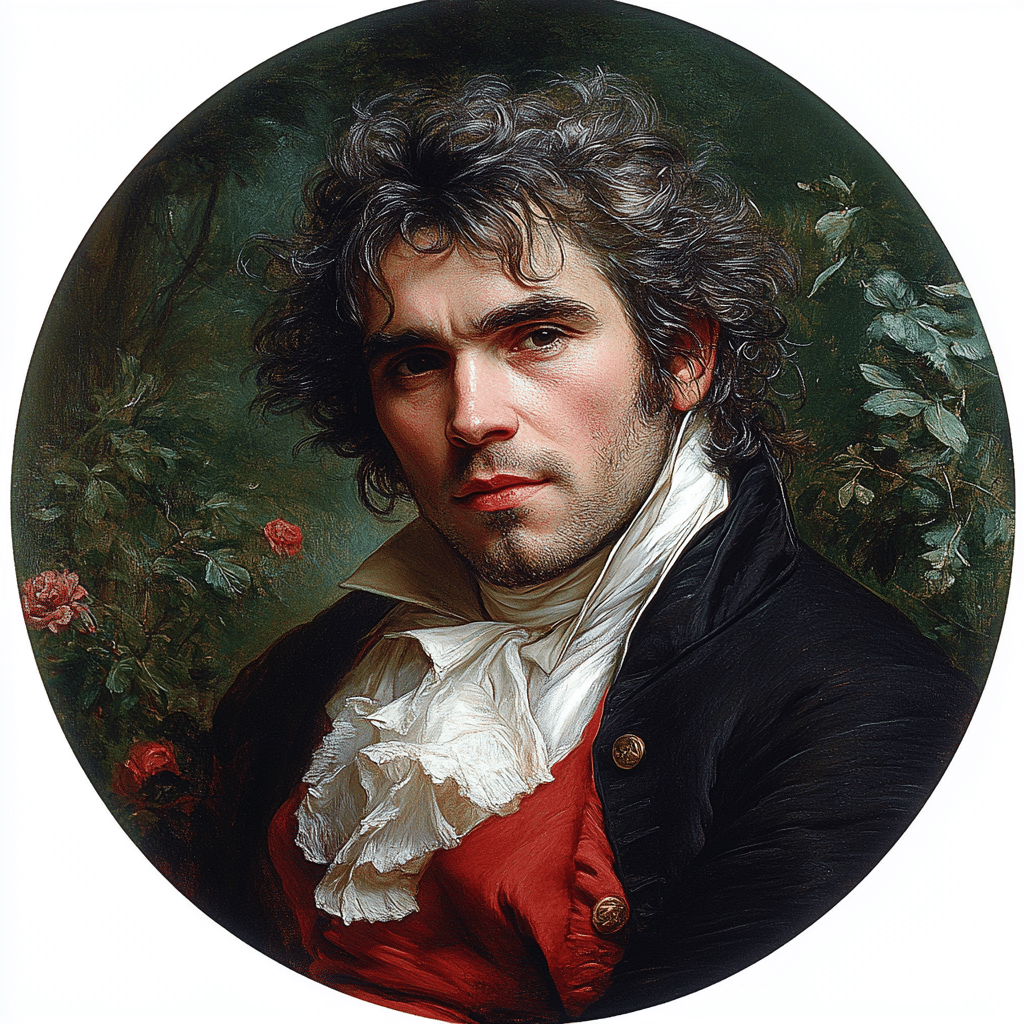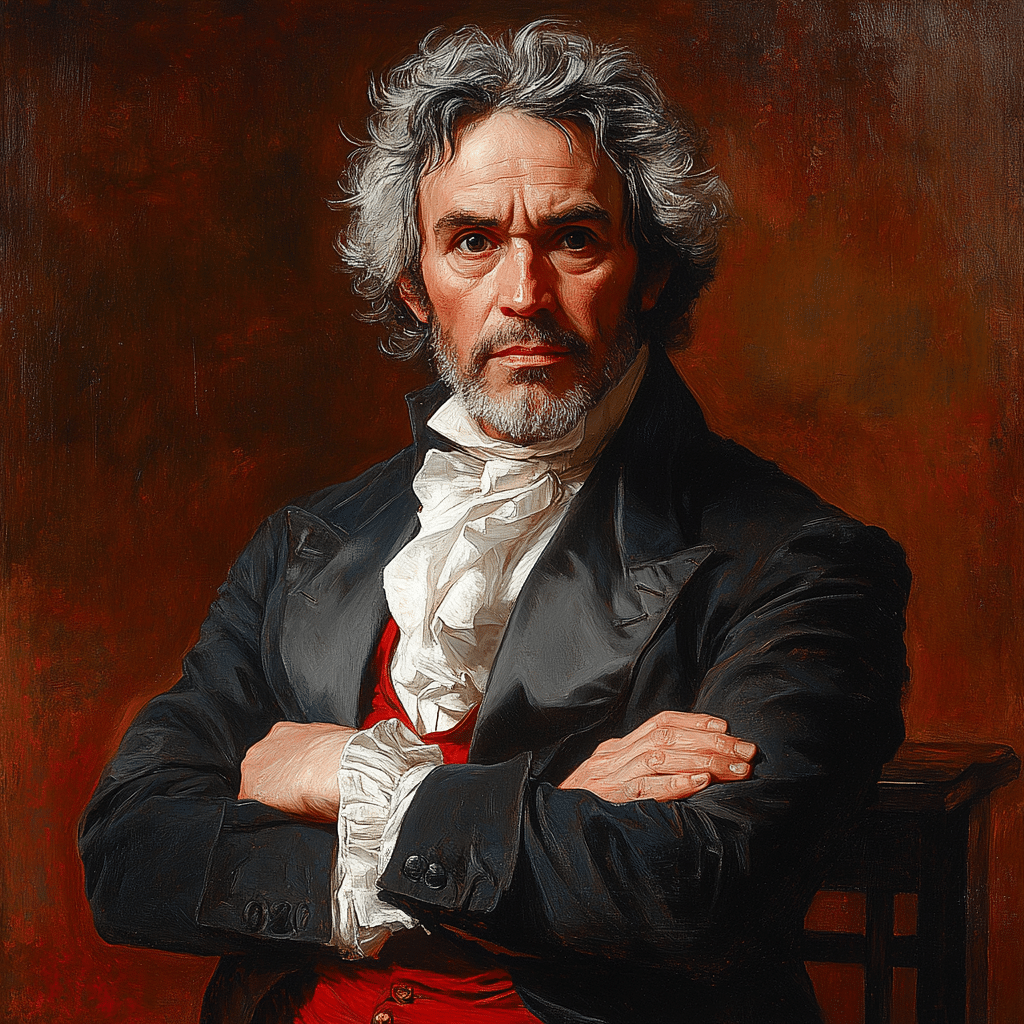When we hear the name Beethoven, we might picture a brilliant composer with flowing hair passionately conducting an orchestra. But the story of Ludwig van Beethoven is far more than just glorious symphonies and sonatas; it’s a tale of serious hardship, resilience, and sheer determination. So, grab your favorite mug of something warm, and let’s dive into the life of one of humanity’s most celebrated geniuses, exploring how Beethoven’s challenges fueled his extraordinary musical journey!

Beethoven: A Prodigy Forged in Hardship
From an early age, Beethoven faced a myriad of obstacles that could have easily sent him packing. Yet instead of bowing out to the pressures of life, he used those struggles as stepping stones on his path to greatness. His story is a reminder that resilience isn’t just an attribute; it’s a skill cultivated through experience, and experience is what Beethoven had in spades.

7 Key Challenges That Shaped Beethoven’s Genius
Beethoven’s childhood was no fairy tale; it was rife with chaos and instability. His father, a wine steward, was often drunk, which turned home life into a stormy sea. This tough challenge made young Ludwig take on a sense of responsibility early on. Music became his escape—a safe harbor in the turbulent waters where he could express his deepest feelings and dreams.
Talk about a plot twist! Just when you think Beethoven’s life couldn’t get tougher, he faced progressive hearing loss starting in his late twenties. Instead of throwing in the towel like some might do, he found inventive ways to keep chiseling away at his music. Imagine a pianist adapting their instrument to feel vibrations—pretty wild, right? Beethoven continued to produce masterpieces like the Ninth Symphony, forging ahead despite going deaf.
Money woes were another thorn in Beethoven’s side, and like an unwelcome guest, they kept popping up throughout his career. Often depending on commissions and finances from patrons, his independent streak made things tricky. Beethoven wasn’t one to play nice with the nobles and aristocrats, which led to periods of serious financial squeeze. The raw emotions he often poured into his compositions reflect the poverty he faced, transforming struggle into art.
As Beethoven’s hearing deteriorated, so did his social life. The loneliness began to swell, casting a pretty dark shadow on his relationships—in both personal and professional realms. This deep sense of isolation deeply informed his music. Just listen to pieces like the “Moonlight Sonata,” which echo sentiments of longing and solitude that resonate with anyone who’s ever felt alone.
Alongside all this turmoil, Beethoven battled chronic health problems. Speculations of lead poisoning make his health story even grimmer! From digestive woes to dips in mental health, these struggles greatly influenced his creative output. Yet, despite the pain and suffering, he found clarity and purpose in his compositions, creating music that still speaks to us today.
Living at a time when classical music was about to morph into something more romantic, Beethoven wrestled with expectations. The pressure was on! He felt the tug-of-war between tradition and the urge to innovate. Symphony No. 5 was his way of smashing through barriers, showcasing how fierce the struggle can lead to artistic breakthroughs. By pushing against the grain, Beethoven paved the way for those who dared to dream.
Beethoven’s life was jam-packed with emotional ups and downs, including unrequited love and personal losses that left their mark. His genius lay in his ability to pour these experiences into dramatic pieces like the “Appassionata” Sonata and the reflective “Piano Concerto No. 5,” sometimes known as the “Emperor.” These emotional depths remind us that true artistry can stem from our most profound struggles.

Beethoven’s Lasting Legacy: Turning Struggles into Artistry
Beethoven’s journey serves as an influential tale of resilience that speaks volumes to us, even today. By mastering the art of thriving amid challenges and chaos, he flipped the script to create music that changed the classical genre forever.
Through every obstacle, Beethoven didn’t just create breathtaking masterpieces; he also set a precedent for future artists. His life story encourages creatives from all walks to find beauty and purpose amid hardships. In fact, it’s more than just a legacy of musical notes; it’s a guiding light teaching us that our struggles can carve a path to our own greatness.
So, the next time you sit down to listen to Beethoven or read about beloved figures like Emma Mackey in popular films and shows, or even explore the quirkiest characters from “Ratatouille,” remember the tremendous challenges that shaped the genius behind the music. There’s something profoundly uplifting about understanding that our own trials can lead, not just to survival, but to significant artistry and impact. Whether you’re diving into a good Charles Dickens book or contemplating the history of health issues linked to legends like Beethoven, let his story inspire you to keep going, no matter how tough the journey gets!

Beethoven’s Remarkable Journey: The Man Behind the Music

The Early Struggles of Beethoven
Ludwig van Beethoven faced a mountain of challenges right from the start. Born in Bonn, Germany, in 1770, he displayed musical talent early on, but his upbringing was far from perfect. His father, a musician himself, was extremely strict and often drunk, leading to a tumultuous childhood. In fact, Beethoven’s experiences with stigmatization, as described through the difficulties he faced growing up, helped shape his character and creative vision. The struggles with his family life would later fuel his passionate compositions, echoing the sentiments of characters in Charles Dickens Books, who often dealt with adversity.
Even as he forged his path in Vienna, Beethoven wrestled with his deafness, a profound challenge for anyone, especially a composer. Despite the odds stacked against him, he created masterpieces that continue to resonate today. His resilient spirit reminds us of the hard-working, tenacious individuals in the performing arts, much like Dasha Austins commitment to her craft. Some might even say he showed a unique flair that could rival the king Of Diamonds, standing tall against the trials life threw at him.
The Genius Emerges
As Beethoven matured as an artist, his music transformed dramatically. He wasn’t just fitting old molds; he expanded the musical vocabulary of the time. His famous symphonies and sonatas broke tradition, making them relatable and emotional. Interestingly, many elements he explored have similarities to themes commonly seen in classic films like Ratatouille, where creativity breaks boundaries. His deep understanding of human emotion allowed his compositions to speak to audiences like no other.
One can’t help but marvel at how Beethoven’s life and works parallel those of modern-day stars. For instance, just as Emma Mackey navigates her career through various movies and TV shows, Beethoven traversed different musical styles, continually evolving. His ability to adapt and overcome setbacks offers powerful lessons for anyone dealing with personal struggles. Like Lechuza, the mythical creature in folklore, Beethoven became a symbol of transformation, emerging from darkness into greatness, reminding us all of resilience in the face of hardship.
Beethoven’s journey wasn’t just about music; it encapsulated a life of relentless pursuit, innovation, and human emotion—all key features of what inspires artists today. Even as interest rates For Homes rise and times change, the themes in his work remind us that true genius will always withstand the tests of time. So, as we reflect on Beethoven’s life, we realize his legacy isn’t just in the notes he penned, but in the lessons we learn from his extraordinary journey.

What are 10 facts about Beethoven?
Beethoven, born in 1770, was a German composer crucial to classical music development. He went deaf later in life but continued to compose incredible works. He wrote symphonies, sonatas, and string quartets, with Symphony No. 9 being one of his most iconic pieces. His music spanned different styles, transitioning from classical to romantic. He had a tough upbringing with a demanding father and faced many health issues throughout his life. Beethoven is also known for his innovations in composition and deep emotional expression. He spent a lot of time in Vienna and was a major influence on many later composers.
What did Mozart say about Beethoven?
Mozart recognized Beethoven’s talent early on and once said, “Mark that young man; he will make himself a name in the world!” This shows that Mozart saw great potential in him, even though there’s debate about whether they actually met.
What was Beethoven’s cause of death?
Beethoven’s death was attributed to liver failure due to alcoholic cirrhosis, complicated by terminal spontaneous bacterial peritonitis, which reflects the serious health problems he faced in his later years.
Did Beethoven have children?
Beethoven never married and had no children of his own, but his second son, Karl, did have descendants. However, the last person to carry the Beethoven name died without a son in 1917.
What is Beethoven’s most famous quote?
One of Beethoven’s most famous quotes is, “To play a wrong note is insignificant; to play without passion is inexcusable,” which embodies his intense dedication to expressing emotion through music.
Why did Beethoven write Fur Elise?
He wrote “Für Elise” as a piece for a woman named Elise, but it wasn’t published until after his death. It showcases his melodic genius and remains a favorite among pianists and audiences alike.
What did Einstein say about Beethoven?
Einstein admired Beethoven and once said, “Beethoven is the only composer who has consistently made people weep; his works are always the best.” This reflects the timeless emotional power of Beethoven’s music.
What did Beethoven do when Mozart died?
When Mozart died in 1791, Beethoven mourned the loss deeply and reflected on the legacy of his mentor. However, there’s no documented evidence of what he specifically did at the time of Mozart’s passing.
Did Beethoven have a perfect pitch?
Beethoven was believed to possess perfect pitch, which allowed him to identify notes without a reference tone. This skill greatly aided his ability to compose and play music, despite his hearing loss.
What was found in Beethoven’s hair?
Research conducted on Beethoven’s hair revealed high levels of lead, which has led some to speculate about the possible effects of lead poisoning on his health and music.
What were Mozart’s last words?
Mozart’s last words are thought to have been “The taste of death is upon my lips,” as he spoke to his family about his illness, showcasing his profound awareness of his impending death.
Which famous composer died of syphilis?
One famous composer who died of syphilis was Franz Schubert, known for his lieder and symphonies, following an illness that plagued him in the final years of his life.
Who inherited Beethoven’s money?
Beethoven’s money was inherited by his brother, Johann, after his death. Johann managed Beethoven’s estate, although he wasn’t very adept, leading to financial struggles in Beethoven’s family.
Where is Beethoven buried?
Beethoven is buried in Vienna, at the Zentralfriedhof (Central Cemetery). His grave is a popular site for music lovers and visitors who want to pay their respects to the legendary composer.
Did Beethoven have an illegitimate child?
There’s no conclusive evidence that Beethoven had an illegitimate child, but there have been rumors and speculations about potential affairs during his life. Nevertheless, he didn’t officially recognize any children.






















